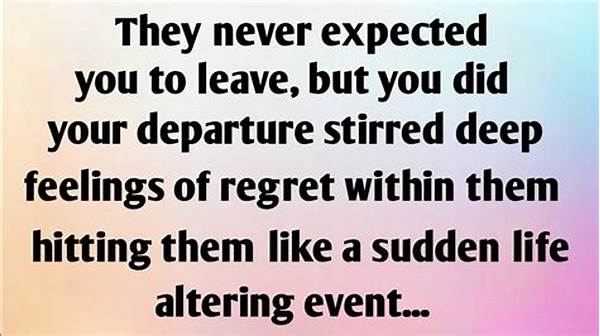
Tearful Departure With Deep Feelings
- Daniel Anderson
- 0
- Posted on
In life, moments of saying goodbye can be some of the most challenging experiences, often bringing about a whirlwind of emotions. A “tearful departure with deep feelings” encapsulates this perfectly, as it evokes imagery of heartfelt connections and the pangs of separation. This notion is universally relatable, as we all have experienced partings that leave lasting impressions on our hearts.
Read Now : Caring For A Gravelly Voice
Embracing Emotions in Farewell
A tearful departure with deep feelings is more than just a goodbye; it’s an emotional rollercoaster that encompasses joy, sorrow, and even relief. Whether it’s bidding farewell to a loved one before a long journey or parting ways with friends after an unforgettable vacation, these moments are packed with emotion. They remind us of the bonds we’ve formed and the memories we’ve created together. It’s a mixture of holding onto cherished moments while accepting the change that lies ahead. This bittersweet sensation is a testament to the depth of our relationships and the impact they have on our lives.
In the thick of a tearful departure, emotions run high, and words sometimes fail us. People might find themselves holding back tears or struggling to articulate their feelings. But, in reality, those expressions of sorrow and joy are a reflection of the connection shared. It’s in these moments that we realize how deeply we’ve been touched by those around us. Whether it’s a long-lasting hug or a simple wave, every gesture holds significance, carrying a message of hope, love, and remembrance. Indeed, a tearful departure with deep feelings is a testament to the shared essence of humanity.
The Language of Goodbyes in Slang
1. “Bounce” – When the time comes for a tearful departure with deep feelings, we often say it’s time to “bounce.” It’s a casual way of acknowledging the need to leave, yet it carries that underlying sentiment of wanting to hold on just a little longer.
2. “Dip” – Sometimes, a tearful departure with deep feelings means we need to “dip,” leaving the scene quickly to avoid emotional overload. It conveys a desire to minimize the sting of parting, but those feelings linger nonetheless.
3. “Peace Out” – A classic farewell, “peace out” is a way to acknowledge a tearful departure with deep feelings while wishing positivity and tranquility. It’s casual but heartfelt, hoping the other person finds peace despite the sadness of goodbye.
4. “Catch You on the Flip Side” – This phrase is a hopeful nod to future encounters, even in a tearful departure with deep feelings. It’s a reminder that goodbyes don’t have to be permanent and that there’s always another chance to reconnect.
5. “Later Gator” – Light-hearted and fun, “later gator” can lighten the mood of a tearful departure with deep feelings. It’s a playful acknowledgment of the heaviness of the moment, with a promise of seeing each other again.
Read Now : Replenishing Electrolytes After Alcohol
Slang Expressions: Adding Flavor to Farewells
In the tapestry of language, slang expressions add a unique flavor to communication, especially during a tearful departure with deep feelings. Slang has the power to simultaneously convey lightness and depth, offering a sense of camaraderie and intimacy in relationships. When someone says, “I’m gonna dip,” during a heartfelt farewell, it softens the blow of leaving, capturing the essence of emotion while maintaining a casual tone. It’s as if slang provides a safety net for our emotions, allowing us to express complex feelings without the weight becoming overwhelming.
Moreover, these slang expressions serve as emotional shortcuts. In moments of a tearful departure with deep feelings, finding the right words can be hard; slang becomes a bridge that connects people through shared cultural understanding. Phrases like “peace out” or “catch you on the flip side” convey more than just the act of parting—they’re infused with hope, affection, and sometimes humor. This use of language becomes a balm, soothing the heart during challenging goodbyes, and creates a sense of continuity, assuring us that this is not the end, merely a pause until we meet again.
Slang: The Social Glue in Goodbyes
The Art of Saying Goodbye
Saying goodbye is never easy, especially when it’s a tearful departure with deep feelings. Here, slang becomes a social glue, binding us in shared understanding and easing the transition. Words like “bounce” or “dip” illustrate a cultural shorthand that instantly communicates the severity—or sometimes the levity—of a departure. These expressions weave a narrative of connection, making the goodbye process just a tad bit easier. They help in acknowledging that while the departure is inevitable, it need not be so formal or bleak. Instead, slang offers a more comforting, relatable dimension to the mix of emotions.
Capturing Complexity with Simplicity
The beauty of slang lies in its ability to capture complex emotions with simple words during a tearful departure with deep feelings. When someone throws up a peace sign and says “peace out,” it’s not just a goodbye—it’s a wish for continued camaraderie and goodwill. In this way, slang is both an emotional release and a bridge across the chasms that separations create. In a world where goodbyes are often loaded with the pressure of finality, slang breaks down barriers, making it easier to express sadness, joy, and hope all at once.
Summary: The Emotional Weight of Slang
At the core, the tearful departure with deep feelings often danced through the lens of slang, reflects our deep-seated need for emotional release and connection. Through phrases like “later gator,” we lighten the emotional load, transforming a potentially overwhelming experience into a manageable moment. These expressions also indicate that even as we part, the connection lingers, held together by an unspoken agreement to meet again someday. Slang, therefore, serves as both a reminder and a promise—acknowledging the present emotional turmoil while gently nudging us toward future encounters, whenever and wherever they may be.